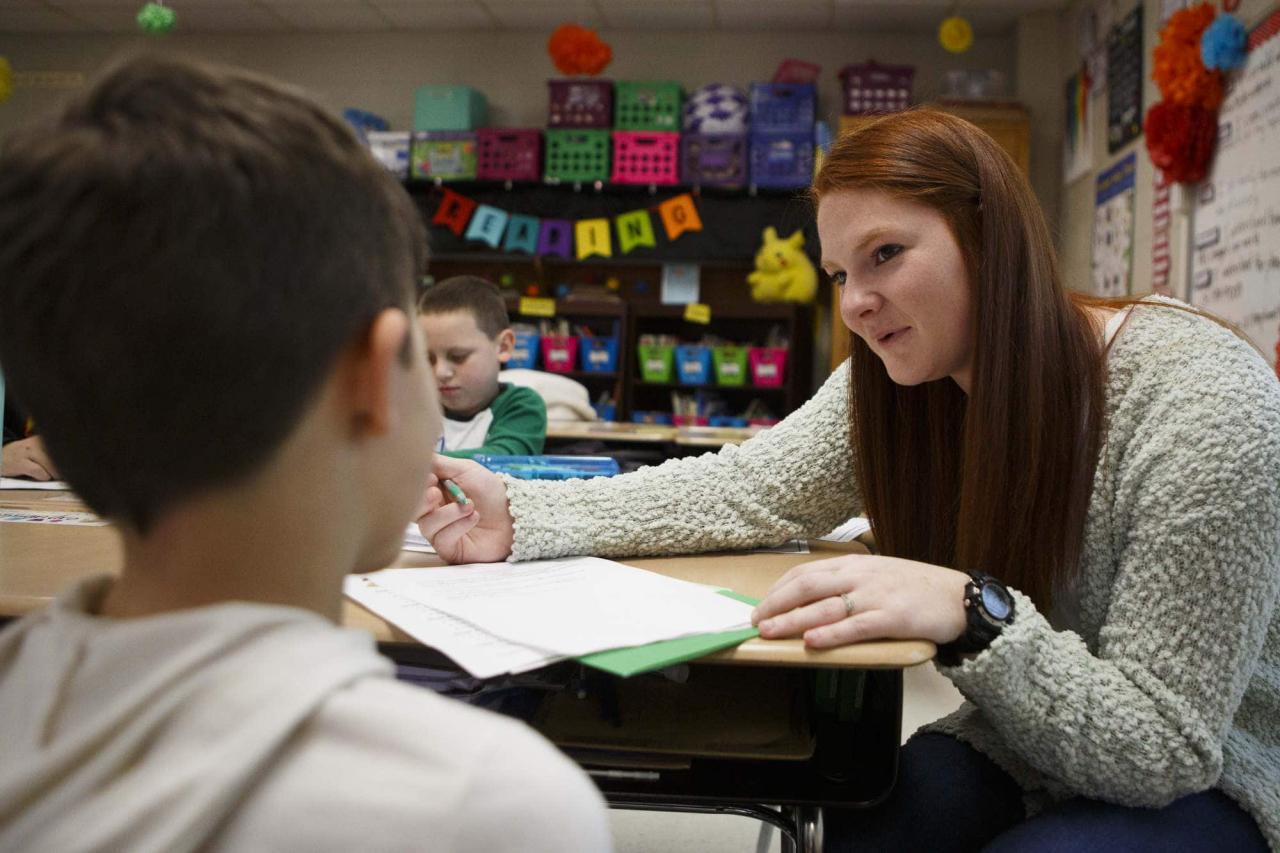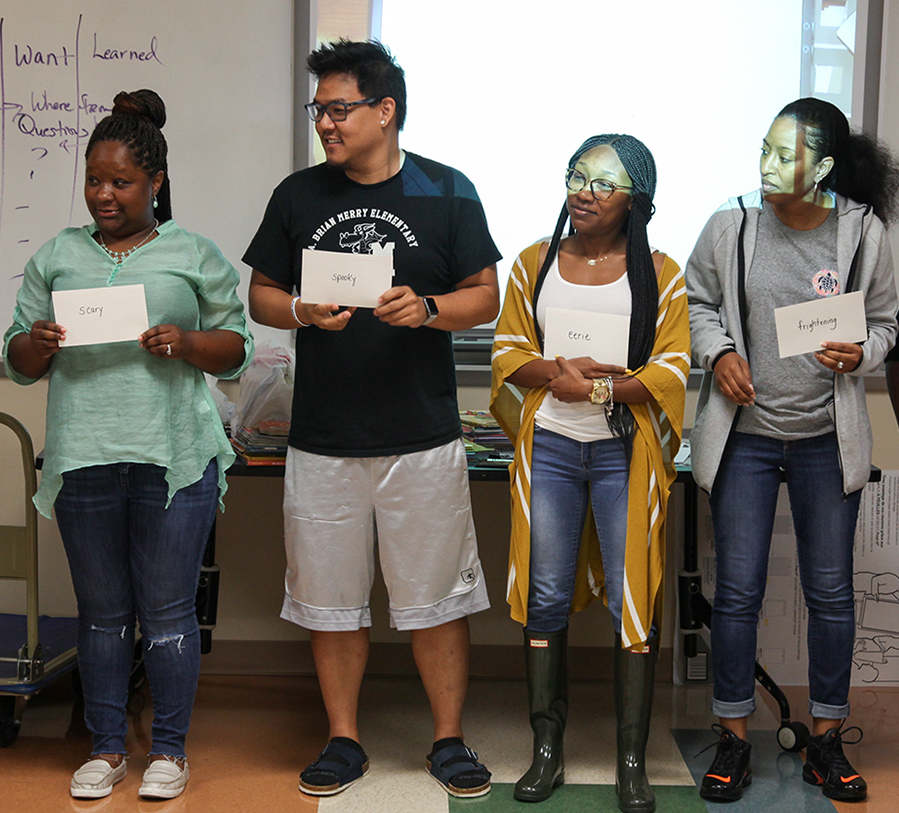
A bachelor’s degree in special education sets the stage for a rewarding career path, offering individuals the opportunity to make a profound impact on the lives of students with diverse needs. This field encompasses a broad spectrum of knowledge, from understanding the intricacies of various disabilities to developing effective teaching strategies and fostering inclusive learning environments.
A comprehensive curriculum equips graduates with the necessary skills to assess, diagnose, and support students with disabilities, enabling them to navigate the complexities of special education and advocate for their students’ success. From individualized education programs (IEPs) to collaborating with families and other professionals, a bachelor’s degree in special education provides the foundation for a fulfilling career dedicated to empowering students and promoting equity in education.
Bachelor’s Degree in Special Education

A bachelor’s degree in special education prepares individuals to work with students who have diverse learning needs. The program equips graduates with the knowledge, skills, and competencies to effectively support and educate these students in various educational settings.
Curriculum and Course Structure
The curriculum of a bachelor’s degree in special education is designed to provide a comprehensive understanding of the field. It encompasses a wide range of subjects, including:
- Foundations of Special Education: This course explores the historical development, legal framework, and ethical principles of special education. It examines the various disabilities and their impact on learning, as well as the rights and responsibilities of individuals with disabilities.
- Educational Psychology: This course delves into the theories and principles of learning, motivation, and behavior. It emphasizes the application of psychological principles to understand and address the unique learning needs of students with disabilities.
- Assessment and Evaluation: This course focuses on the methods and tools used to assess the strengths and weaknesses of students with disabilities. It covers various assessment techniques, including standardized tests, informal assessments, and portfolio reviews.
- Instructional Strategies: This course explores a variety of teaching methods and strategies specifically designed for students with disabilities. It emphasizes differentiated instruction, assistive technology, and individualized education programs (IEPs).
- Legal and Ethical Considerations: This course examines the legal and ethical implications of working with students with disabilities. It covers topics such as confidentiality, informed consent, and the Individuals with Disabilities Education Act (IDEA).
- Collaboration and Consultation: This course emphasizes the importance of collaboration between educators, parents, and other professionals involved in the education of students with disabilities. It focuses on communication skills, team building, and advocacy.
- Field Experiences: The program includes practical field experiences in various educational settings, such as schools, clinics, and community organizations. These experiences allow students to apply their theoretical knowledge and develop their practical skills.
Core Competencies and Skills, Bachelor’s degree in special education
A bachelor’s degree in special education develops essential competencies and skills, including:
- Knowledge of Disabilities: Understanding the characteristics, causes, and impact of various disabilities on learning.
- Assessment and Evaluation Skills: Conducting comprehensive assessments to identify students’ strengths, weaknesses, and needs.
- Instructional Design and Delivery: Developing and implementing effective instructional strategies tailored to the unique needs of students with disabilities.
- Collaboration and Communication: Effectively communicating with students, parents, and other professionals involved in the educational process.
- Advocacy and Legal Knowledge: Understanding and advocating for the rights of students with disabilities within the legal framework.
- Ethical Decision-Making: Applying ethical principles to make informed decisions about the best interests of students with disabilities.
Real-World Applications
The knowledge and skills gained through a bachelor’s degree in special education have a wide range of real-world applications, including:
- Special Education Teacher: Working in schools to provide individualized instruction and support to students with disabilities.
- Special Education Specialist: Providing consultation and support to general education teachers on strategies for working with students with disabilities.
- Assistive Technology Specialist: Assessing and recommending assistive technology devices and software to enhance the learning experiences of students with disabilities.
- Early Intervention Specialist: Working with young children who have developmental delays or disabilities to provide early intervention services.
- Rehabilitation Counselor: Providing counseling and support to individuals with disabilities to help them achieve their personal and vocational goals.
Career Paths in Special Education
A bachelor’s degree in special education opens doors to a wide range of rewarding careers. Graduates can work in various settings, from schools and hospitals to community organizations and private practices. These professionals play a crucial role in supporting individuals with disabilities, helping them reach their full potential and live fulfilling lives.
Roles and Responsibilities of Special Education Professionals
Special education professionals are responsible for creating individualized education programs (IEPs) for students with disabilities. They collaborate with parents, teachers, and other professionals to determine the best course of action for each student. Their roles often involve assessing students’ needs, developing and implementing educational strategies, and providing support to students and their families.
Types of Career Paths in Special Education
- Special Education Teacher: Special education teachers work in schools, providing direct instruction to students with disabilities. They develop and implement individualized education programs (IEPs), collaborate with parents and other professionals, and create a supportive learning environment for their students.
- Special Education Specialist: Special education specialists work in various settings, including schools, hospitals, and community organizations. They may provide specialized instruction, conduct assessments, or develop and implement intervention programs. They often work with students with specific disabilities, such as autism, learning disabilities, or physical impairments.
- Early Intervention Specialist: Early intervention specialists work with young children (typically ages 0-3) who have developmental delays or disabilities. They provide individualized support to help children reach their developmental milestones and prepare them for school.
- Behavior Analyst: Behavior analysts work with individuals with disabilities to improve their behavior and communication skills. They use evidence-based practices to assess and modify behavior, and they work with families and other professionals to develop individualized intervention plans.
- Special Education Administrator: Special education administrators work in school districts or other organizations to oversee the implementation of special education services. They may develop policies, manage budgets, and supervise special education staff.
- Special Education Advocate: Special education advocates work to ensure that students with disabilities receive the appropriate services and support. They may work with families to navigate the special education system, advocate for students’ rights, and provide information and resources.
Impact of Special Education

Special education has a profound and positive impact on individuals with disabilities, empowering them to reach their full potential and lead fulfilling lives. It provides tailored support and interventions that address their unique needs, fostering their academic, social, and emotional growth.
Positive Impact on Individuals with Disabilities
The benefits of special education extend beyond academic achievement. It creates a supportive environment that promotes self-esteem, confidence, and a sense of belonging. Special education programs often include:
- Individualized Education Programs (IEPs): IEPs are tailored to each student’s specific needs, setting individualized goals and outlining strategies to achieve them.
- Assistive Technology: This includes tools and devices that help students with disabilities access information and participate in learning activities.
- Therapeutic Interventions: Special education often incorporates therapies such as speech-language therapy, occupational therapy, and physical therapy to address specific needs.
These interventions and support services are crucial in helping individuals with disabilities overcome challenges, develop their abilities, and achieve their goals.
Successful Interventions and Support Services
Special education has proven effective in addressing various disabilities. For instance, early intervention programs for children with developmental delays have shown significant improvements in cognitive, language, and social skills.
- Speech-language therapy has been successful in helping children with communication disorders improve their articulation, fluency, and language comprehension.
- Occupational therapy has aided individuals with physical disabilities in developing fine motor skills, sensory processing, and daily living skills.
These interventions have not only enhanced the lives of individuals with disabilities but also equipped them with the skills and knowledge necessary to participate actively in society.
Role of Special Education in Promoting Inclusion and Equity
Special education plays a vital role in promoting inclusion and equity by ensuring that all students have equal opportunities to learn and thrive. It advocates for the rights of students with disabilities, ensuring they receive appropriate accommodations and support to succeed.
“Special education is about ensuring that every child has the opportunity to learn and grow, regardless of their abilities or challenges.”
By fostering a culture of inclusivity and understanding, special education helps to create a more just and equitable society where everyone can reach their full potential.
Future Trends in Special Education: Bachelor’s Degree In Special Education
The field of special education is constantly evolving, driven by technological advancements, shifting societal views, and a growing understanding of the diverse needs of individuals with disabilities. This dynamic landscape presents both challenges and opportunities for educators, researchers, and policymakers.
Emerging Technologies and Innovations in Special Education
Emerging technologies are transforming how special education is delivered and experienced. These innovations offer exciting possibilities for personalized learning, accessibility, and inclusion.
- Assistive Technology: Assistive technology (AT) plays a crucial role in empowering individuals with disabilities to participate fully in education and society. Advancements in AT include:
- Speech-to-text software: This technology enables individuals with physical or cognitive limitations to communicate effectively by converting spoken words into written text. Examples include Dragon NaturallySpeaking and VoiceOver.
- Adaptive learning platforms: These platforms use artificial intelligence (AI) to personalize learning experiences based on individual needs and learning styles. Examples include Khan Academy and Duolingo.
- Augmented and virtual reality (AR/VR): AR/VR technologies are creating immersive and engaging learning experiences for students with disabilities, particularly in areas like STEM education and social-emotional learning.
- Data Analytics and Personalized Learning: Data analytics tools are being used to collect and analyze student data, providing insights into individual learning patterns, strengths, and areas for improvement. This information enables educators to create personalized learning plans that cater to each student’s unique needs.
- Telehealth and Remote Learning: The COVID-19 pandemic accelerated the adoption of telehealth and remote learning technologies in special education. These technologies allow students to access specialized services and support from qualified professionals regardless of their location.
Evolving Needs of Individuals with Disabilities
The needs of individuals with disabilities are becoming increasingly diverse and complex. This evolving landscape requires a nuanced understanding of the unique challenges and opportunities faced by different disability groups.
- Neurodiversity: There is growing recognition of the unique strengths and perspectives of individuals with neurodevelopmental differences, such as autism spectrum disorder (ASD) and attention-deficit/hyperactivity disorder (ADHD). Educators are increasingly adopting approaches that celebrate neurodiversity and provide individualized support to help students thrive.
- Mental Health and Well-being: The prevalence of mental health challenges among children and adolescents is on the rise. This trend has significant implications for special education, as many students with disabilities experience co-occurring mental health conditions.
- Social-Emotional Learning (SEL): SEL is becoming increasingly recognized as a crucial component of education for all students, especially those with disabilities. SEL programs focus on developing students’ self-awareness, social skills, and emotional regulation, which are essential for academic success and well-being.
Challenges and Opportunities Facing Special Education
The field of special education faces a number of challenges and opportunities, including:
- Funding and Resources: Special education programs often face funding challenges, which can limit access to essential resources and services.
- Teacher Shortages: There is a persistent shortage of qualified special education teachers, particularly in rural and high-need areas.
- Inclusion and Accessibility: Ensuring inclusive and accessible learning environments for all students with disabilities remains a significant challenge.
- Advocacy and Empowerment: Empowering individuals with disabilities and their families to advocate for their rights and needs is essential for creating a more equitable and inclusive society.
Conclusive Thoughts

A bachelor’s degree in special education opens doors to a world of possibilities, empowering graduates to become agents of change and make a tangible difference in the lives of students with disabilities. The field is constantly evolving, with new technologies and research shaping the future of special education. Graduates with a passion for education and a commitment to inclusion are well-equipped to contribute to this dynamic field and create a more equitable and accessible educational experience for all.
Helpful Answers
What are the job prospects for special education graduates?
Graduates with a bachelor’s degree in special education can pursue a variety of roles, including special education teachers, intervention specialists, behavior analysts, and educational diagnosticians.
What are the admission requirements for a special education program?
Admission requirements vary by institution but typically include a bachelor’s degree, a minimum GPA, and specific coursework in education and psychology. Some programs may also require standardized test scores or an interview.
What are the key skills needed for a career in special education?
Key skills include patience, empathy, strong communication skills, a passion for working with diverse learners, and the ability to adapt teaching methods to meet individual needs.
Is a master’s degree required for a career in special education?
While a bachelor’s degree is the minimum requirement for most entry-level positions, a master’s degree can enhance career opportunities and lead to higher salaries and more specialized roles.




